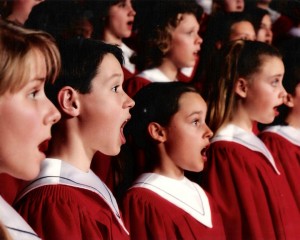When I left to study German in Bamberg, Germany for a month in 2005, I couldn’t even count to 10 in German. I had studied German diction in grad school and had sung in German, but I didn’t actually know how to say anything beyond memorized text. As a result, the teachers in the language program I attended were a little taken aback when, with my extraordinarily elementary communication skills, I would pull out the German word for “sorrow” or “weeping” or “trout” or “brook.” To a singer, there’s nothing surprising in knowing those words. You learn them the first time you sing a Bach aria or Schubert art song. To a language instructor who is accustomed to working with the average business man or tourist, well, it’s unexpected.

I remember learning words in elementary and high school in a similar, indirect way. I had already been exposed to terms like “dynamics” in children’s choir before learning about “static vs dynamic” in science class. When I learned “tiempo” and “fuerte” in Spanish 1, they sounded like and shared similar definitions to “tempo” and “forte,” common music terms I had been hearing for years. Concepts reappeared as well. Turns out, time signatures are little math equations. The labels used for musical forms are similar to those used in analyzing poetry. Organizing and understanding musical sections of a piece is just like outlining a research paper.
Community theatre productions taught me a great deal, too. My director explained what “polysyllabic” meant when I was part of the Caterpillar in Alice in Wonderland when I was 10. The Caterpillar sings about using “a polysyllabic word, or two.” I remember when that word showed up on a standardized test. The stage taught me about Hans Christian Anderson, the French Revolution and Cervantes, about reading dialogue, developing characters, thinking empathetically and understanding conflict and resolution. In the meantime, technical theatre nerds like my fiancé were spending hours learning and applying geometry and physics by hanging lights, considering color temperatures, and designing and building sets. They were managing people, props and scene changes. They were developing leadership skills.
I started thinking about this while spacing out in bed this morning. I am recovering from pneumonia, so my job is currently to do just that, space out in bed. Really, I was thinking about pneumonia, about the pains in my back and side, most likely some form of pleurisy, and then it occurred to me why I already knew that word when it was first mentioned as a possible cause of my pain. I said a version of that word night after night when playing Laura in “The Glass Menagerie” a couple of years ago. Laura is a girl who suffered from pleurosis in high school, which was mistakenly heard as “blue roses” at the time by her present day gentleman caller. “Blue Roses,” he nicknamed her, melting her heart and solidifying her lifelong crush on him. I looked up the word when prepping the role, and still it sits, like so many other learned concepts, somewhere in the back of my mind, ready to be pulled up at a moment’s notice. You see, the learning never stops, and it never gets old.
I arrive at my point.
Dear Principals who doubt the value of artistic study, you are wrong. I, like so many choir and theatre kids, began my education with music and theatre. I, like so many professional and socially conscious adults, continue my daily education through music and theatre. I cannot think of a single reason why your kids should not do the same.


This is incredible Elise, thank you for reminding me why I love to sing and the endless opportunities there are to learn and grow as a musician and human being.
And thank you for reading…and singing!